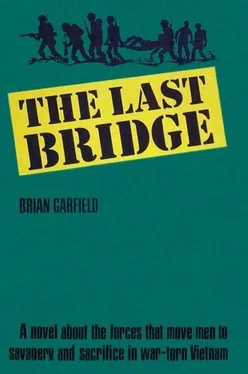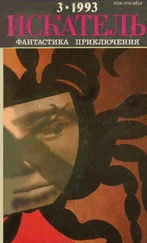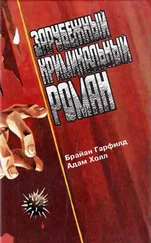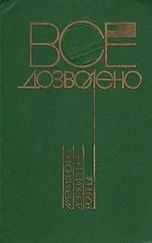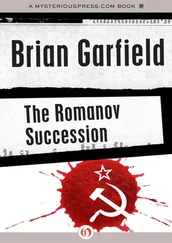“Good enough. It’s a crackerbox — if we can get at it.”
J. D. Hooker said, “Wrought iron, Colonel. Put a small charge on one pier and a big charge in the middle. It’ll break in half like a puking doughnut.”
Tyreen broke open his clasp knife and tore a shredded hole in the forward hang of the tarpaulin. It opened his view through the small window in the back of the truck cab; he could see Sergeant Sun’s shoulder and had a view of the road through the windshield. Sergeant Sun turned his head and shot a swift, expressionless glance through the glass.
Corporal Smith crawled anxiously out of his corner, bracing himself against the lurch and sway of the truck. His face was flushed. “Permission to speak, Colonel?”
“What is it?”
“I got no right to another chance, sir. But I’m all right now. I’m okay. I can feel it. I’m okay now.”
J. D. Hooker said, “Why don’t you sit down before you fall down, kid?”
“All right, Corporal,” said Tyreen. “We’ll see.” He caught Saville’s speculative squint. He said to Corporal Smith, “Suppose you climb up front and ride with Sergeant Sun. You know the route.”
“Yes, sir,” Smith said. He climbed outside with grateful alacrity.
Theodore Saville said, “You can’t depend on him, David.”
“What do you want me to do? Shoot him?”
J. D. Hooker said, “He’s dead weight, Colonel.”
Sergeant Nguyen Khang sat at the back of the truck with one hand on the jouncing machine gun. He spoke up: “Once a guy cracks up, you’d have to be out of your cotton-picking gourd to trust him again, sir.”
Hooker turned on him: “Nobody asked you to put in your two cents, peckerhead.”
Khang got his feet under him. It was the first time Tyreen had seen him angry. Tyreen said, “Settle down, both of you.”
Khang said, “Maybe you feel like letting him get away with that, Colonel, but not me.”
Tyreen said, “If I had time, Sergeant, I’d be pleased to let the two of you fight it out of your systems. I haven’t got time.”
Hooker stood bent over beneath the tarp, fixing Khang with a bellicose stare. Theodore Saville pushed him down roughly. “You heard the Colonel. You’ve hocked your stripes already — don’t start fooling with a guardhouse term, Hooker.”
Khang settled back slowly and braced one foot against the machine gun. After a moment he lighted a cigarette and grinned brashly. He looked like a man who did not believe in tomorrow — or if he did, he didn’t care.
Tyreen turned his attention through the forward window. The road was a rutted path scudding across a rock-strewn mountainside. Distant peaks were dark suggestions through the drizzling cold rain. The obscurity of the weather was a blessing, but Tyreen had to fight off irritation with it. His face was glazed and dour. Once he raised his head sharply, thinking he saw a light far ahead, but it did not reappear. The air was layered in misty velvet, and he might have been an island in the midst of a silent, hostile ocean. The truck clattered through a short, high-sided defile, and Theodore Saville said, “Can’t be far now.” A sluggish current of air curled in under the shredded hang of the bullet-torn tarp; it chilled Tyreen’s sweaty skin. He wanted to swallow a quinine capsule, but he put it off. He felt blindfolded by the pressure of the tarpaulin. Feeling crowded, he disliked the feeling with unreasonable impatience. He felt Saville stir, as though scenting imminent trouble, but there was nothing in sight or earshot. The road turned, sidling against timbered hillsides, descending a series of switchbacks into the violet half-light of the rain forest. Every shadow seemed to conceal a threat hiding from discovery. Nguyen Khang’s shadow at the back of the truck was gray and indistinct. Tyreen peered ahead and said abruptly, “Take your posts. I see some houses ahead.”
There was a scrape of movement behind him. He cleared his gun. Seen closer, the jungle huts sat perched on hillsides as if they were about to fall off. Here and there smoke lifted sluggishly through a thatched roof. Theodore Saville peered through a pushed-back corner of the tarp; his steady eyes watched everything, and Tyreen could not escape the conviction that every detail was being indelibly absorbed into the big man’s memory.
The truck came to a slow halt. The morning was deep and still. Sun’s voice and Corporal Smith’s voice ran through it softly, apprehensively. Tyreen spoke from the window. His words sprawled softly and easily: “It’s nothing, just a bunch of poppy farmers crossing the road — I think they’re a little drunked up.” The truck started moving again, and he put down the gun. They passed the village. The Montagnard tribesmen gave as little attention to the army truck as they might have to a buffalo cart.
The smell of the jungle was oppressive. Saville moved close to Tyreen and spoke quietly. “Smith ain’t the only one.”
“Everybody’s scared,” Tyreen said.
“What are you scared of?”
“I don’t know.”
“You’re scared to give in, David. Scared to admit it when you get too sick and too beat-up to fight. You used to be the best fighter there was.”
“I still am.”
“No. But you’re scared just the same.”
Tyreen said, “I’ll tell you something, Theodore. Not one of us would have come on this mission if we hadn’t been scared of something.”
Chapter Twenty-two
1005 Hours
Up front, Nhu Van Sun’s foot was reaching for the brake, and Tyreen pitched forward with the abrupt stop. He heard J. D. Hooker’s “Jesus H. Christ! ” All Tyreen could see was dark jungle on both sides of the road. No one was in sight. Tyreen flapped back the tarpaulin.
Corporal Smith leaned out of the seat. “Almost missed it,” he said. “Sorry we shook it up, Colonel. This is where we get off the road. End of the line. Chutrang’s just over the ridge, there.”
Tyreen said, “All right. Let’s pull off the road.”
The truck backed and jockeyed and rammed into the rain forest. They stopped after thirty feet of travel, and when he looked back Tyreen could not see the road.
Corporal Smith got down and said, “Hang on a minute, sir.” He cupped his hands to his mouth and spoke rapidly in a singsong tongue, calling toward the south.
Tyreen got out of the truck. “Everybody out.”
A handful of figures appeared in the forest, a knot of men in white Oriental pajamas. Corporal Smith’s talk rattled at them. Saville muttered at Tyreen, “Must be a Montagnard dialect, hey?”
A soft, light voice uttered a command, and the white costumes flapped a little in the rain. One figure moved forward — a woman, slight and supple. Her voice was young. “ Les Américains ?”
Smith talked quickly, using his hands. Tyreen heard his own name. Saville said, “What the hell?”
The young woman advanced, carrying a carbine. Her face was shaded by a conical hat of woven straw. “I am Lin Thao. It is all right, Colonel. I speak English.”
She did not smile. Tyreen wished he could make out her features. What did a name mean? The rain was slow and cold. Tyreen said, “Corporal.”
“Yes, sir. Her brother’s Ngo Kuy Thao. He runs the village.”
The young woman said, “My brother is dead, Corporal.”
Tyreen heard Smith’s slow intake of breath. Under Lin Thao’s loose blouse the shoulders lifted and fell, a tired gesture. “The Vietminh...”
“Your brother was killed?”
“Eventually.”
“I’m sorry,” Tyreen said. He felt awkward and irritable.
“We found him in the jungle. This morning. He had been beaten. He was returning from Chutrang to tell us about Captain Kreizler.”
Читать дальше
